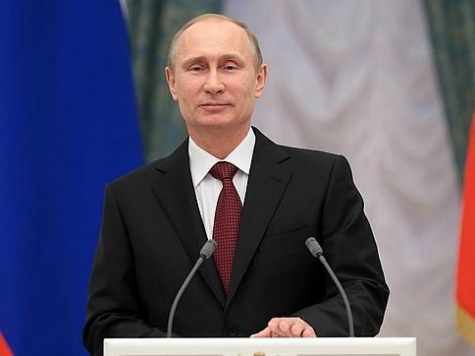
Russia has achieved a strategic psychological victory over NATO in the Ukraine with the announcement by Foreign Minister Sergei Lavrov in Geneva that an agreement had been reached with Ukrainian and NATO member diplomats to ease tensions in the country.
Over the last few weeks, NATO has been shown to be economically unstable, fully dependent on Russian energy, and lacking a meaningful military deterrent. Russia has brutally humiliated NATO and has strategically reemerged as the dominant nation in Europe.
The Geneva, Switzerland, talks were originally supposed to focus on disarming illegal militant groups in Ukraine, de-escalating tensions, and instituting the constitutional reforms promised in February following the ouster of pro-Russian former President Viktor Yanukovych. But the new terms of the “deal” make no mention of constitutional reforms and grant amnesty for all pro-Russian protesters. There is some language about prosecuting criminals, demanding illegal armed groups disband, and requiring protesters occupying government buildings to leave, but no one will aggressively challenge the pro-Russians sympathizers’ actions.
After succeeding in annexing the Crimean peninsula from the Ukraine by popular demand, Moscow sought to bait the Ukrainian government into violent reprisals against pro-Russian protestors and government building occupiers in eastern and southern Ukraine. But unlike the Crimea where the support for Russia was overwhelming, eastern pro-Russian protests were often met with large pro-Western counter-demonstrations. Without the supportive political conditions to welcome a military intervention, Russia fostered the maximum amount of turmoil in the hope the Ukraine military would violently retaliate against both paramilitary groups and civilians.
The Ukrainian government did begin an “anti-terrorism” campaign in eastern Ukraine in an attempt to drive out mobs of pro-Russian forces that had barricaded themselves inside federal buildings near the Russian border, demanding the government disarm. The worst violence was the death of at least three pro-Russian militants and the injury of thirteen others as Ukrainian National Guard and police were attempting to repel a crowd of roughly 300 attacking the Black Sea navy base of Mariupol with Molotov cocktails according to the Associated Press.
Russia has succeeded in stopping any further talk of Ukraine joining NATO and must be ecstatic with the state of paralysis in the nation that was already facing financial insolvency and default. The International Monetary Fund had already approved a loan in March that required politically painful austerity spending reforms. Those reforms include doubling of residential natural gas prices and adopting a floating currency exchange rate that will devalue the buying power of worker’s salaries and pensions.
With a highly contentious Ukraine presidential election coming on May 25th, Russia will be able to criticize the legitimacy of the vote count and feed bitter historic antagonism against politicians in the western Ukrainian capital city of Kiev. If continuing protests cause the elections to be delayed, Russia can push for a break-up of the country or a decentralization of power. Either event would strengthen Russia’s position and humiliate the credibility of NATO as a friend and ally to other Eastern European nations.
President Vladimir Putin is enjoying a 75% approval rating at home since the beginning of his muscular response to Ukraine. As a former KGB operative, Putin has the luxury of choreographing events in a way that emphasizes his defiance of perceived Western meddling in other nations’ internal affairs. Fearing a scenario like the Ukraine, I expect a number of countries to move away from NATO and re-establish “harmonious relationships” now that Russia has reemerged as the dominant power in Europe.
The author welcomes feedback and will respond to comments by readers.

COMMENTS
Please let us know if you're having issues with commenting.